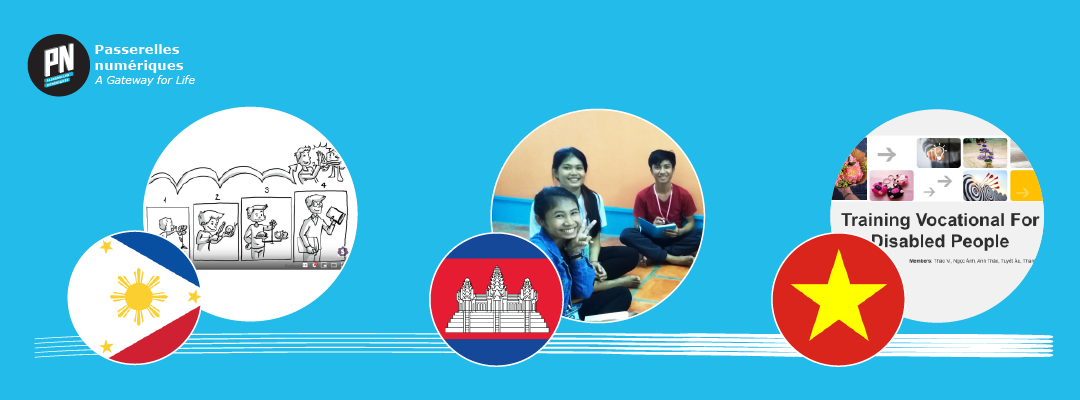Passerelles numériques’ mission is not only to provide IT training to underprivileged students but also to ensure that they will escape poverty in a sustainable way. To do so, we try to prepare them to become self-sufficient, responsible adults, by helping them to acquire solid general knowledge and gain a better understanding of the world around them.
Passerelles numériques’ Education teams, therefore, support our students through a complete Education Curriculum including numerous Developmental Activities (DA). Let’s find out about a few examples of these very specific activities!
To illustrate the wide range of topics that are covered by the Passerelles numériques Education Curriculum, we selected one example for each center in Cambodia, the Philippines and Vietnam.

In the Philippines, we’ve implemented a module called “Becoming an adult” for our 2nd-year students (following on from the “Becoming mature” module in their 1st-year) which focuses on understanding themselves better.
Throughout a series of workshops, games, role-plays, brainstorming and videos, our students will improve their understanding and accept physical, social, emotional and cognitive changes. This will make them more mature and responsible so they can be ready for adulthood.

Example of a role-play in which students have to play one mature and one immature role.
You are a taxi driver in Cebu City. Your family has been renting a house for 15 years now. You have children studying in College already. Your wife is always pressuring you to buy a house or take out a loan to do so because of the lack of space for you and your family.
One day, your customer happens to be a rich Swedish businessman who wants to go to the GV Tower Hotel. You take him there and he accidentally leaves a bag of money in your cab. What do you do?
All this help and advice that we try to share and teach them will help our students grow into responsible, mature people and develop their critical thinking. It will also help them make choices, handle challenging situations and become a role model for other PN students and their community, as we try to teach them the value of RESPONSIBILITY.

In Vietnam, we set up a “Community Projects’’ module which focuses on getting a better understanding of the social context and issues in Danang/Vietnam. By putting into practice what our 3rd-year students learned about project management: in groups, they had to identify one social issue or person/community in need and implement specific, concrete actions.
One project involved providing crafts training for disabled people so they can make a living. For three months, the students had to identify their beneficiaries by contacting local organizations, raising money to buy supplies, developing and rolling out a teaching plan and assessing their project.

Another one involved fundraising for underprivileged people. Thanks to various activities (selling food and crafts), the students were able to provide a local orphanage with pens, notebooks and thermos flasks. They also helped rebuild a hut.

This type of training assesses our students’ project management skills as well as helping them understand their local community and be an active part of it. It is also a great illustration of how we try to apply our value of SOLIDARITY to everyone.

Lastly, in Cambodia, we have introduced a “ASEAN” (Association of Southeast Asian Nations) module which gives our students a wider vision and understanding of the world around them.
To raise awareness about ASEAN, our education team organizes a number of activities such as an official presentation by a professional in international relations or via videos. The idea is to give our students a better understanding of their country, but also the other neighbouring countries and highlight common challenges and difficulties to overcome.

The team is also organizing a debate contest based on a Model ASEAN Meeting (MAM), a simulation of an ASEAN Summit with an introduction speech and a debate on a selected topic.
For this, the students are split into groups, each representing an ASEAN country. They have a short time to prepare (1h), present (5min) and debate (1h) with the aim of finding a compromise.



Thanks to this activity, our students can improve on both their soft skills (English, public speaking and critical thinking) and their general knowledge of South East Asia. This overall challenge demonstrates the DEMANDING APPROACH we ask our students.
These three examples perfectly illustrate our holistic approach to education. Let’s round off with a few words from Nguyen Dong Tran, our Education coordinator in Passerelles numériques Vietnam:

